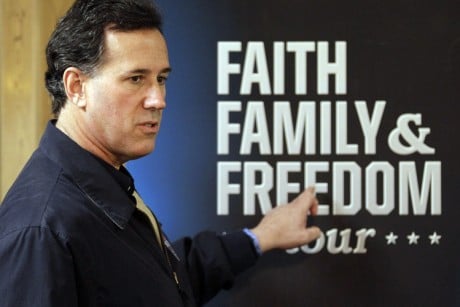Rick Santorum is becoming the anti-science gift that keeps on giving.
Yesterday, while speaking in his home state, the former Pennsylvania senator once again tilted at the idea of human caused global warming, saying that it is based on “phony studies,” and really a case of “political science.”
This is, you will note, a clear attack on climate scientists. It suggests 1) that climate researchers have either done bad research or, worse still, perpetrated falsified or fraudulent research; 2) that the norms of their field are somehow inadequate to prevent dubious conclusions from becoming accepted; 3) overall, climatology is a body of research that you just can’t take seriously.
Any climatologist would find this insulting. Any climatologist would consider this an affront.
Which is why it is so amazing that Santorum then went on to claim that he isn’t anti-science—no, it’s the Democrats who are the problem:
When it comes to the management of the Earth, they are the anti-science ones. We are the ones who stand for science, and technology, and using the resources we have to be able to make sure that we have a quality of life in this country and (that we) maintain a good and stable environment.
Please.
To me, one key part of the definition of being anti-science means failing to respect the results and the integrity of the scientific process. Here, Santorum is doing precisely that. He is picking and choosing which science is good, which science is bad, and throwing out global warming research—arbitrarily, selectively, and politically.
Why does he do this? Well, it is at least in part reflective of the fact that Republicans as a whole do the same thing. As I have noted previously, the data suggest that they just don’t trust environmental scientists or the results they put out. I know Republicans do not think they are anti-science, but to me, distrusting a whole field of research definitely earns them that label.
There is one word in the statement above, by the way, that fascinates me. It is the word “stable.”
If you are a conservative like Santorum, then you feel very strongly the need for stability: stable political systems, stable markets, stable institutions, stable families and social norms. And, apparently, stable environments.
Conservatives, much more than liberals, like order, regularity, structure. So Santorum’s use of the word “stable” is well tailored to his audience.
Here’s the thing, though: Global warming may well prove to be the most destabilizing force the planet has ever seen. The most disruptive, destructive, and disorderly planetary phenomena that we have created. This is why the Pentagon and CIA are worried about it—they are worried about where millions of people are going to live in the brave new world we’re creating.
So overall, I think the irony meter just hit eleven. Santorum, claiming to be pro-science, attacks scientists. Santorum, claiming to support environmental stability, denies the most destabilizing threat of all.
Santorum, allegedly pro-mirror, refuses to look in one.
Subscribe to our newsletter
Stay up to date with DeSmog news and alerts






